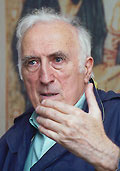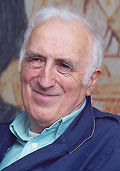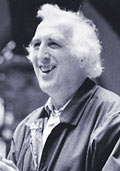|
|
Jean Vanier: “I think it’s true (that depression is rampant) because
today people feel lost.” Catholic New World file photos
Depression: healing a first-world epidemic
|
|
|
|
The Interview, a regular feature of The Catholic New World, is an in-depth conversation
with a person whose words, actions or ideas affect today’s Catholic.
It may be affirming of faith or confrontational. But it will always
be stimulating.
|
|
This week’s Interview is with Jean Vanier.
Jean Vanier is a man with a passion for both the spiritual and
the physical. When he came to Holy Name Cathedral in October 1999,
the pews were packed with people suffering disabilities—some visible,
some not.
They had come to hear Vanier, founder of the worldwide L’Arche
community movement, preach about understanding and trust. L’Arche,
French for “Ark,” is a community founded to assist the disabled.
Vanier, whose newest book is “Depression: Way to Healing,” also
is founder of the Faith and Light lay movement, which has 1,500
communities in 72 countries.
The life of this Canadian, who left a brilliant military career
to study philosophy and theology, took an unexpected turn in 1964,
when he met two mentally handicapped people, whom he welcomed
into his home, and removed from their state of neglect in a psychiatric
hospital.
Vanier founded L’Arche community, with the help of his two new
friends. In the community, men and women of different social backgrounds
live with handicapped individuals. Since the birth of the first
small French community, 103 additional ones have been established
throughout the world, embracing 26 countries and more than 2,000
members, including one formed in Chicago last year.
He was interviewed by Zenit, an international news service with
ties to the Vatican.
Zenit News Service: You are an expert in spirituality, handicaps
and ecumenism. Why did you decide to write a book on depression?
Jean Vanier: I have met too many individuals, Christian and non-Christian,
who have lost their self-confidence, and are imprisoned by feelings
of sadness and guilt. It is as if they had enormous barriers around
themselves. They are men and women who do not really believe that
God loves them, when the first thing that Christ says to us is:
You are precious, you are valuable, you are important.
ZNS: But you are not a psychologist.
JV: Many of the handicapped in our communities manifest the same
tendency, not so much of depression, as clinically understood,
but of feelings of lack of worth. In fact, when parents have a
handicapped child, they are disappointed, and the child feels
unwanted. Some of these wounds are normal, inevitable, but the
impression is very deep in the subconscious. Later, when they
have to face other rejections, the underlying wounds surface again.
This is the basis of depression.
The whole pedagogy in L’Arche is to reveal that this is not so:
“You are beautiful, we are happy to be with you.” Our treatment
consists above all in being happy, and being so together, to transform
the negative self-image into a positive one. The purpose is to
transform the fear of living with a desire to live.
ZNS: It is said that depression is the existential evil of our time.
JV: I think it’s true because today people feel lost.
ZNS: More than in the past?
JV: Before, we had the faith, which gave direction and offered moral
guidelines. Today many anchors have been destroyed by the idea
that the individual’s freedom comes before anything else—except
that now we no longer know how to direct this freedom. ... Today
people want much, but they don’t know where to direct their vital
energies—hence, their feeling of sadness. Moreover, there is early
failure in marriages.
People are aware of the chaos in themselves: violence, banal sexuality,
inability to forgive. Men are more aware of the wounds they carry
within. Before, living in the domain of morality and will, many
people were able to bear difficulties, although their reasons
were not always pure. Today confusion prevails.
ZNS: Are you saying that depression is the offspring of ideologies:
for instance, rationalism, the Enlightenment? Or, perhaps, consumerism?
JV: No, ideologies come in second place. As I don’t feel loved,
I submerge myself in a political project or even in consumerism.
ZNS: But, why is depression typical of the so-called developed
world?
JV: Because in the West, people don’t know what to do with their
leisure. There are no amusements in Africa; one struggles to survive
and to eat. All one’s energies are in the service of life; and,
when one works, there is no depression. Instead, free time is
the (opportunity) for family conflicts, and lack of creativity
because of television. In this environment, one wonders about
the meaning of life.
ZNS: Do we have too much free time, then?
JV: That’s not the problem; rather, we don’t know how to use it.
The people who know how to exploit it discover the fruitfulness
of loving, of caring for the elderly, of being concerned for others.
ZNS: Do you think, therefore, that volunteer work is an antidote
to depression?
JV: It depends. If it is simply to care for handicapped children
or the poor, no. When, on the contrary, it is an encounter with
the other, an exchange of love, then it becomes communion and
confidence that can heal our wounds.
ZNS: Does the world’s competitiveness make us more fragile?
JV: Yes, we are much more fragile. Unbridled individualism gives
birth to depression. Of course, we must not underrate physical
and genetic causes. We still do not know what can be cured with
medication and what can be cured with psychology.
However, I always say that three things are necessary, in order
to have valid psychotherapy: a good community, a job we like,
and faith. On the contrary, today many individuals no longer have
a family or friends, or a worthy job, nor the faith that allows
them to put reality into perspective. Then, not even the best
therapy works.
ZNS: However, you say that even Christians, who have the faith,
get depressed.
JV: The three elements are necessary simultaneously: All human aspects
are related. And by saying this, I do not diminish the importance
of medication: I have seen believers who have picked up thanks
to Prozac.
ZNS: Would you establish an L’Arche community for those suffering
from depression?
JV: No. Instead, centers must be created where these people can
meet and talk. Groups must be created, such as Alcoholics Anonymous,
in which people with the same problem exchange impressions and
understand that they are not alone, that sadness is an illness
that can be overcome, that it is not a disgrace. Depression is
normal; it often happens between 40 and 55 years of age, the midlife
crisis. People must be helped to understand that it is a period
of change, that spring can follow winter.
Front Page | Digest | Cardinal | Interview
Classifieds | About Us | Write Us | Subscribe | Advertise
Archive | Catholic Sites | New World Publications | Católico | Directory | Site Map
|









